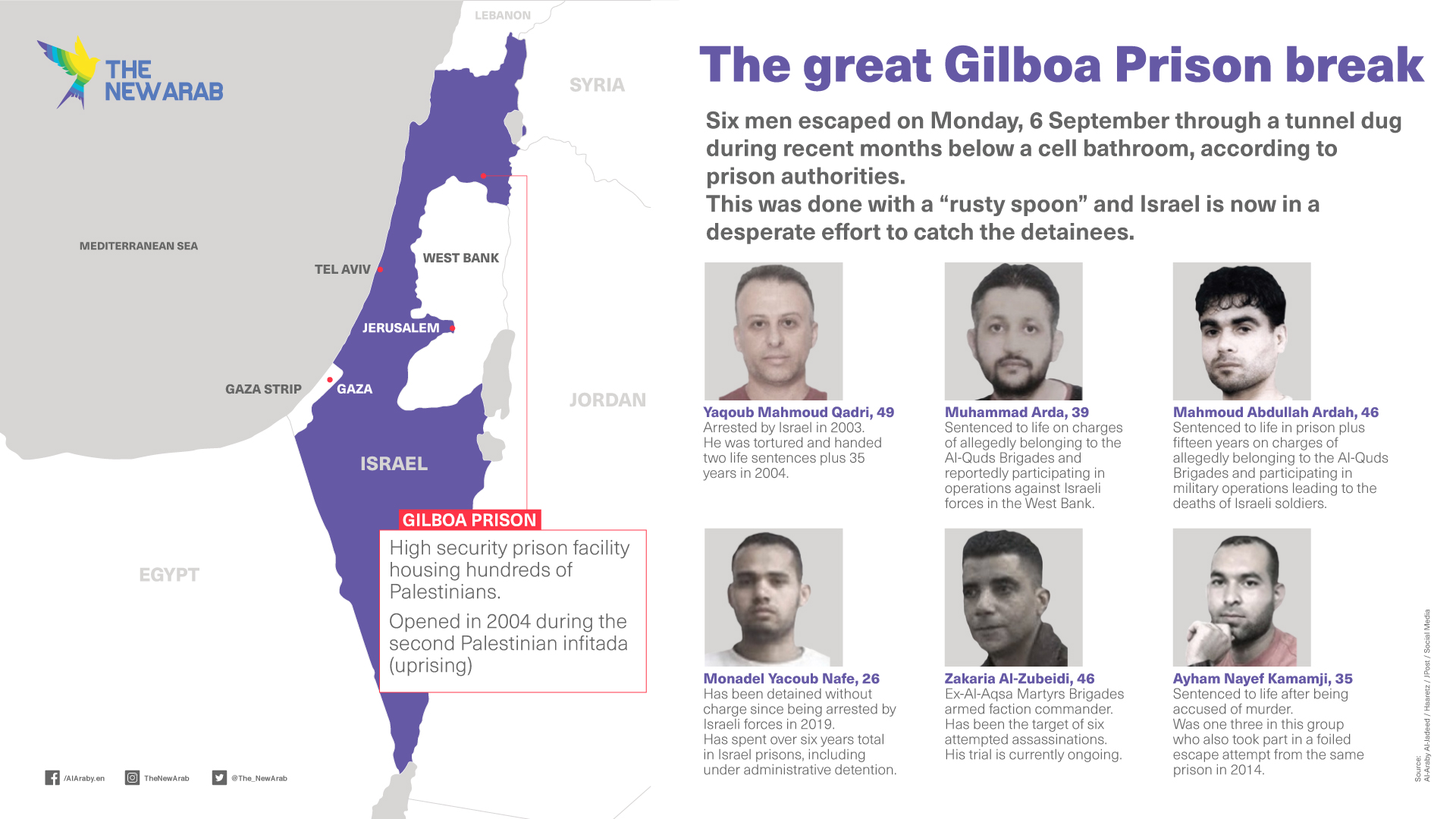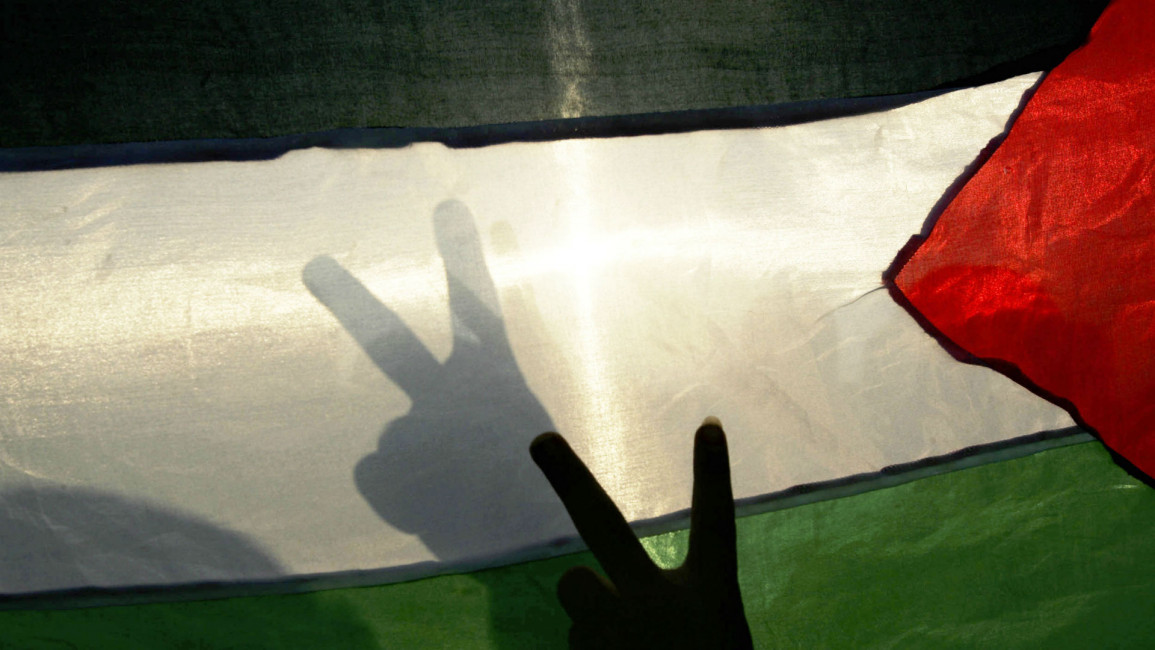
For Israel, the Gilboa prison break is a disaster. For Palestinians, it's a moment of hope and dignity
Monday morning's headlines in Israel sounded more like a Hollywood movie plot than anything else. Six Palestinians imprisoned in the country's most secure prison, Gilboa, managed to tunnel their way to freedom with a rusty spoon in a stunning jailbreak.
Despite the seemingly insurmountable odds stacked against them, the escapees succeeded in blindsiding and making a mockery of Israel's entire defence establishment. Five members of the militant group Islamic Jihad and one high-profile leader from Al-Aqsa Brigades are still on the run; outsmarting Israel's intelligence services, army and police, and dealing a substantial blow to the arrogance and self-proclaimed superiority of the occupier.
"The Gilboa prison break has stirred a unifying sentiment of hope and a spirit of resistance among Palestinians from all walks of life"
News of the escape was received with jubilance on the Palestinian street and it has unified Palestinians from all backgrounds and political affiliations, including critics of violent resistance and rivals of the Islamic Jihad, as they celebrate an iconic slap in Israel's face.
Even the collaborationist Palestinian Authority that usually shies away from praising Palestinian armed resistance, lest it anger western donors, hastened to express support for the jailbreak. As PA prime minister Mohammad Shtayyeh said on Tuesday, "Our detainees have the right to seek their freedom in any way possible."
Indeed, Palestinians have every right to celebrate this unique incident with pride and hope, not for who the prisoners are, or what Israel says they have done, but for what they now represent to the public, and what their jailbreak symbolizes.

The will to resist
The Gilboa prison break has stirred a unifying sentiment of hope and a spirit of resistance among Palestinians from all walks of life - a testament that the uncompromising and undefeated will of the oppressed will always prove itself stronger than the oppressor's brutal might. It is an eloquent and poetic testament to Palestinian steadfastness, ingenuity and strong yearning for freedom, life, and dignity.
The determination and stubbornness of these six unarmed Palestinians shattered an image Israel has always been keen to promote; one of invincibility, superiority, and strength.
One million prisoners
Few issues can rile up the Palestinian street like that of prisoners inside Israel. It has always been one of the central pillars of Palestinian nationalism and collective identity, on an equal par with Jerusalem and the question of refugees' right of return.
It's an agony that literally every Palestinian family has endured. In virtually every Palestinian household, there is at least one member who has been imprisoned by Israel. In fact, Israel's imprisonment of Palestinians is now so arbitrary, routine, and normalized, that by some estimates Israel has arrested and detained over one million Palestinians since its occupation started in 1967.
"Occupied Palestinians are trialed in kangaroo military courts with a 95 percent conviction rate"
And so, the news of any Palestinian being freed from an Israeli prison is usually cause for celebration. Not just for their direct family, but for the public at large; for we are all intimately familiar with what it means to break free from yet another layer of Israeli oppression.
Palestinian ex-detainees always wear this title with pride; a title indicative of the sacrifices they have made for the cause, and as proof that Israel couldn't break their spirit with confinement or torture.
Apartheid in action
Israel's imprisonment of Palestinians is highly emblematic of its ruthless apartheid regime and deeply flawed justice system. The glaring and unjust discrimination that characterises Israel's court system is evident in countless instances. For instance, Palestinian children can be sentenced to up to 20 years in prison for stone-throwing, while Jewish Israelis always get a free pass for those very same actions.
Occupied Palestinians are trialled in kangaroo military courts with a 95 percent conviction rate, while Israeli settlers and soldiers are seldom put on trial in any court for their daily brutalities and abuses against Palestinians.
When Israeli snipers maimed and killed scores of Gazan protesters at the perimeter fence who presented zero danger to them, only one soldier was sentenced to 45 days of community service. This preposterous outcome wasn't because he killed a Gazan teenager, but merely because he shot without authorisation.
Meanwhile, Mohammed El Halabi, the head of World Vision's Gaza office has been locked up in an Israeli prison for five years now without sentence, in the longest trial in Israel's history. Israel has no evidence to prove the accusation that he diverted aid money to Hamas, but he is being kept in prison to avoid negative PR, should Israel admit that it imprisoned a Palestinian humanitarian worker on false grounds.
In other words, Israel has for many years used its prison system to intimidate, suppress and humiliate the general population to keep them in line; so the remarkable and ultimate defiance seen in this escape is an iconic triumph against that injustice; a perfect encapsulation of the David and Goliath standoff.
The Palestinian public is, however, fearful that Israel will now seek to kill those six prisoners to turn them into a cautionary tale to demonstrate its strength. There are equally substantial fears that Israel will use the prison break as a pretext to impose more arbitrary and brutal restrictions on the rest of the Palestinians it imprisons. This would spark a serious escalation throughout the occupied territories.
Muhammad Shehada is a Palestinian writer and analyst from Gaza and EU Affairs Manager at Euro-Med Human Rights Monitor.
Follow him on Twitter: @muhammadshehad2
Have questions or comments? Email us at editorial-english@alaraby.co.uk
Opinions expressed in this article remain those of the author and do not necessarily represent those of The New Arab.




